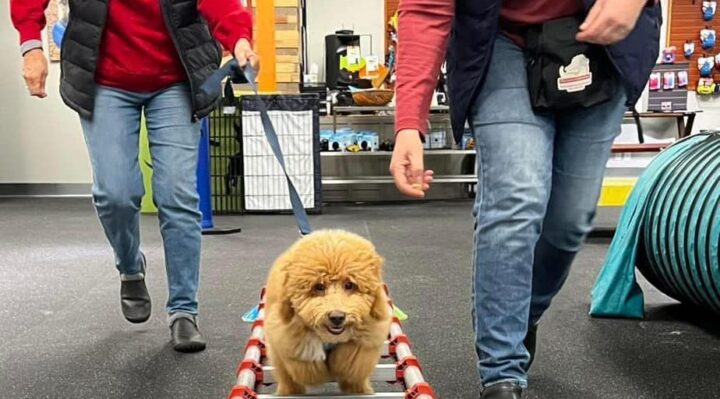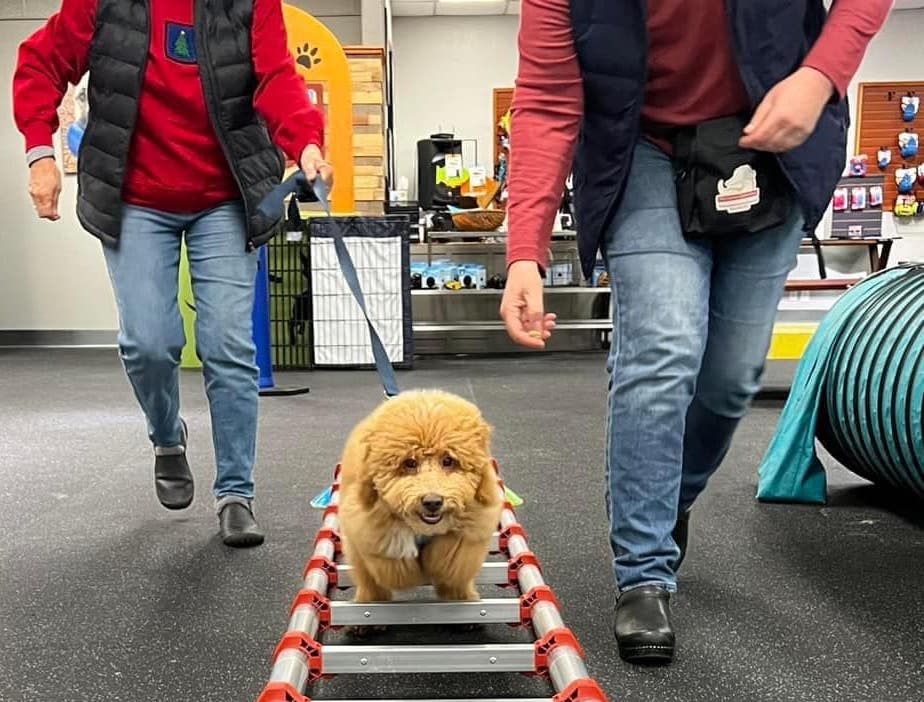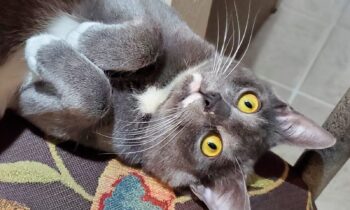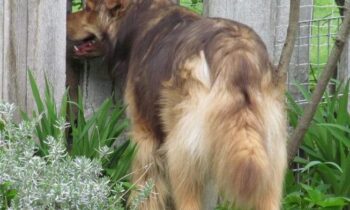
Are you expecting? A puppy, I mean! Are you expecting to add a puppy to your household this year? Are you excited? Maybe you’ve met the puppy’s mother, possibly some other relatives, even before the litter is born. You’re planning ahead as carefully as possible to be as ready as you can be on the day you bring your new family member home.
You have so many questions. There is a lot to learn. Friends and family with dogs (and even some without) all seem to have opinions on how you should raise your puppy so it grows up to be a well-behaved, well-adjusted, happy, and healthy adult dog. That’s what you want, too, of course!
One question you hear often is, “Are you going to puppy classes?” You read more, you wonder, you have to decide. Is puppy class important for your puppy to attend? Should you register for a class? What class, where, and why?
I asked knowledgeable friends online, dog professionals and experienced dog guardians, to offer their answers to these questions:
► “Is puppy class Important?”
► “Why? What is important about puppy class?”
► “What does a puppy learn in puppy class?”
► “What does the puppy’s guardian learn?”
► “What should a puppy’s guardian look for in a puppy class?”
► “Is there any reason *not* to take a puppy to a great puppy class?”
► “What would a poor puppy class look like?”
► “Why should puppy guardians avoid poor puppy classes?”
I am grateful, as you should be, that these friends were willing to share their answers. They want the best for your puppy, and for you. Here are their suggestions and opinions.
Kat Camplin (California) Positive puppy experiences are important, but those may or may not be found in a traditional puppy class. I took my puppy to a traditional class and the trainer didn’t understand behavior and was using puppies to make other puppies bark and lunge as they went by. That’s not a good learning experience for either puppy, so we didn’t go back. If you follow the rule that everyone should have a good time, you can do that anywhere. It’s just easier when there’s a planned group and supervision.
Sandie Hanlon (Massachusetts) Puppy classes should not be a big play session. Structured life skills and discussions about proper socialization, teaching the humans how to reinforce the behaviors they want, positive reinforcement training, proper equipment like the right harness, leashes, collars, crate games—all are essential for puppy training. Teaching a ‘place’ cue to the puppy on some kind of platform or dog bed is very helpful for owners. It’s important to help the pups learn to be around other dogs and feel safe, to learn to focus while other pups are around them. And if the puppy consents, play at the end of the class is also good for them.
Jennifer Grant (New Mexico) A good, well-controlled force-free puppy class can really help the puppy and support their people. If I had a pup, I would be looking for a good class. I learned the hard way in college when I adopted a pup. Did all the things—the books, the private trainer, took him out in the world—but I didn’t do class. He was afraid of men and male dogs for the rest of his life, and I think a careful safe puppy class might have prevented that.

Photo by Sarah Richardson
Don Hanson (Maine) I believe the most important reason for a puppy class is to educate the people. COVID caused me to convert our program from an in-person class to an online program. We continue doing it that way today, with many students starting and completing the four-week class before they even bring their puppy home. We cover how dogs learn, canine and human communication, stress and emotions, as well as puppy stuff like house training, play biting, chewing, jumping up, socialization, and nutrition. They finish class prepared for bringing their puppy home. (I meet with students and their dogs privately as necessary.) We really don’t start on behaviors like sit, leave it, etc. until our Basic Manners class, which is an in-person, semi-private class with no more than two dogs. We also started doing that during COVID, reducing from five dogs per class and two instructors to two dogs per class and one instructor. Students and instructors like it better, as each student gets more attention.
Kathleen Huggins (Washington) Yes. Puppy learns more about socialization, has chances to build self-confidence. Owner learns about dog interactions, owner dos and don’ts. I believe it’s a very important step for both pup and owner. Not the only step, but one of many. We had one experience of a class with a trainer who had bias against our chosen breed, and it was obvious. That was horrible for us. Now we always ask questions about their experience with our breed. Poor classes, among other things, are when owners aren’t really engaged with the learning—they don’t control their dog, they think they know more than the trainer, and they don’t respect other dog boundaries even when informed. If there is any question about safety (illness-related because of cleanliness of facility, lax standards for vaccinations, or lack of control of aggression), avoid.
Kenna Stonefern (New Hampshire) I recommend puppy kindergarten to new dog owners. They need all the care information and often have questions about crate training, housebreaking, etc. If they are experienced, then we discuss their plans and I make recommendations on an individual basis. I personally recommend puppy school only for ‘new’ dog people. My contract requires level 1 and level 2 obedience at a minimum. Puppy kindergarten does not count. That said, we keep puppies a full month longer than most breeders in my breed and we have already started with basic obedience by the time the puppies go to their new homes.
Gwen Jones (California) Yes! A well-structured puppy class is helpful for most puppies. I do not like allowing play-time during a puppy class. I prefer that people learn to keep their puppy’s attention on them, not on the other puppies in class—challenging puppies with environmental stimulation, introducing real-world situations (skateboards, mailboxes, big hats, etc.), to build confidence while maintaining connection.
Isabel Alvarez Arata (Texas) Puppy class is a very generic and general term. I’d have to know what the class entailed to determine if it were beneficial. That said, I love to see families start training proactively and not wait until the dog has behavioral concerns to then start training.
Stine Theede (Idaho) I am only able to offer private lessons and I love puppy clients where I can really educate them about puppy behavior, development, preventative training, learning, understanding the individual puppy, and how to make training/socialization/exposure right for it. I then give pointers on how to identify good trainers and classes, as well as other good settings to further the puppy’s education in safe, positive ways, including but not limited to puppy classes that provide a proper place to practice focus with distractions. Puppy classes may also provide a good place to get your puppy a couple of appropriate playmates for regular private play dates.
Mandy Collins (United Kingdom) Yes. If the class is tailored to the puppies and guardians, it uses the six weeks to provide knowledge and skills for the training journey, rather than aiming to reach training goals, and prepares the guardians for adolescence! In an ideal world, I would start with one-to-ones and the puppy teams would graduate to classes once they have some basic skills such as reflex to name, let’s go, settle, and focus.
Lynn Brezina (Illinois) I do not believe puppy classes are important and, in fact, I think they are ill-advised for several reasons. (1) Beginning learning should be done in the least distracting environment possible, and that is not what a group class environment provides. (2) Puppies have a lot of growth and development occurring and furthermore, suddenly, they have a new environment to adjust to, which includes a household of humans in varying ages and numbers. That is enough for a while. Puppies need a lot of down time. (3) Training should begin as soon as the puppy comes into the home. Crate training, housebreaking, and setting up the environment so as to maximize the puppy’s successful assimilation into their new home can’t wait for a group class to begin. This all needs to happen immediately. This is where the humans really need our support and guidance. (4) Puppies need to bond with and trust their new people. The way some puppy classes are run interferes with that bonding and trusting. All puppy classes are not equal. (5) Because group classes can be so distracting, the humans don’t get much out of them. (6) Group classes make excellent second steps, once the puppy and its people have a little training under their belts, to proof and augment their earlier learning.
Brae Raphael (Oregon) I took Karen Pryor’s course—from her book Puppy Start Right: Foundation Training for the Companion Dog—which was super helpful in starting my own puppy classes. (There were some things that I found a little outdated, like ‘pass the puppy.’) Over the last 20 years, I’ve found that my classes have catered more to teaching puppy parents how to solve common puppy problems, and helping them understand dog behavior and body language. The skills taught are all about prevention, keeping handler and puppy safe in this crazy changing world. My goal with puppy classes is teaching guardians that there’s no such thing as a perfect puppy, but rather how to learn to live peacefully with this tiny little creature. Guardians learn the perspective from a puppy’s point of view, and how we are all in this together. Puppy socials, on the other hand, are super fun, which is my goal. My puppy socials are for 8- to 16-week-olds only. We focus on what play should look like and go over continuing socialization outside of class, introducing puppies to the vet/groomer, husbandry skills, Leslie McDevitt’s Pattern Games for focus, and understanding arousal and how to not create adrenaline junkies in puppies and adolescents.
Eileen Anderson (Arkansas) A good puppy class can be invaluable. A poorly run or inappropriately focused class can be harmful. You don’t have to take your puppy to a class to socialize or raise them successfully. But it’s worth checking out what’s available near you. Here’s how to assess whether a class can be a positive experience for your pup.
In our book, Puppy Socialization: What It Is and How to Do It, Marge Rogers and I teach guardians to look for the following qualities in a class for young puppies during their sensitive period for socialization.
1. Careful attention to hygiene
2. The classes should follow the safety requirements listed in the American Veterinary Society of Animal Behavior’s AVSAB Position Statement on Puppy Socialization.
3. A focus on exposure to new experiences rather than training ‘obedience’ behaviors. We have the dog’s whole life for training, but the sensitive period for socialization is a very narrow window.
4. Strict age requirements; no mixing of boisterous adolescents with young pups in their socialization period
5. Ample use of toys and play to create positive exposures to the opportunities in the class, including carefully supervised interaction with other pups, and interaction with humans outside their family.
6. Inclusion of guardian education: teaching them about body language so as to identify fear in its early stages rather than when the puppy is melting down, and how to pair new experiences with food and/or play.
7. Puppy’s choice. No forced interactions. No ‘pass the puppy,’ but puppies are free to investigate other humans during appropriate periods.
8. Accommodations such as visual barriers for shy puppies who need graduated exposure to the rest of the group. Puppies go at their own pace.
9. ‘Confidence courses’: surfaces and objects for the pups to explore. Introduction to vet equipment such as scales and otoscopes (paired with things the puppy loves) a plus.
10. Alternation of active periods and chill-out periods
Poor Puppy Class Attributes
Use of punishment and corrections
Overly focused on obedience behaviors during socialization period
Mixture of ages
Forced participation of shy puppies (flooding)
Free-for-alls where puppies have poorly supervised interactions with each other; for instance, allowing bullying
Focus on dominance or pack theory
Em E Wolf (Vermont) Eileen, best puppy book!!! We just re-released our podcast episode with you and Marge today!
NEXT WEEK: More input and information from dog professionals who are happy to share their thoughts and to support their opinions on the topic of Is Puppy Class Important?



